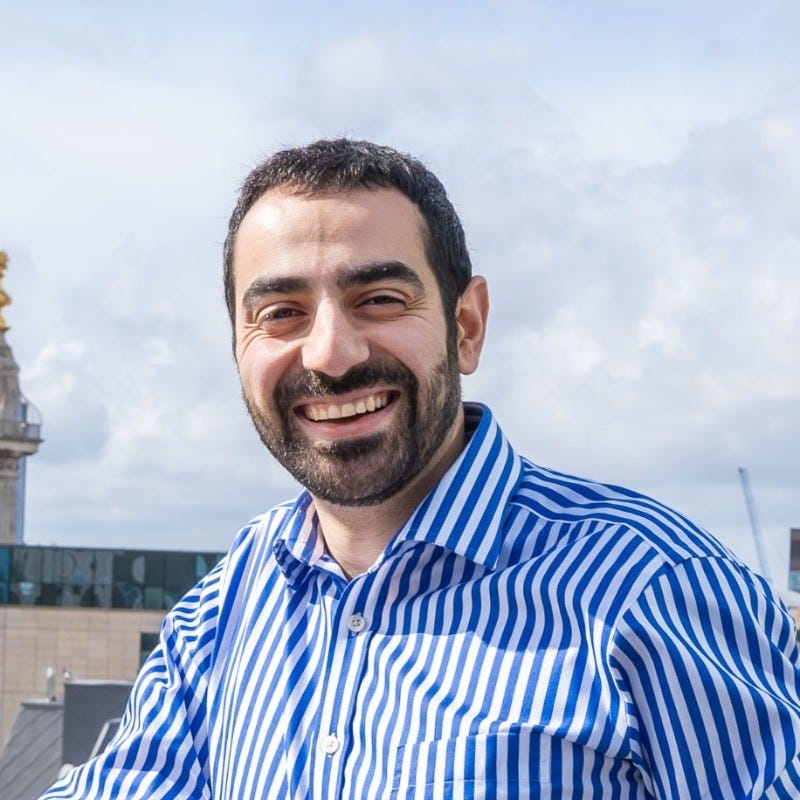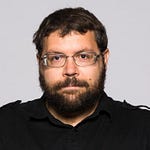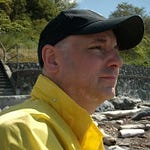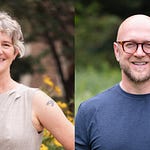Friends,
I’m wading back into fully produced podcast episodes with today’s interview. The full episode is available to paying members, and free subscribers can listen to the first 18 minutes. To support more conversations like this and unlock more interviews, original essays, and craft resources, please consider upgrading your subscription.
Many thanks,
Josh
A Conversation with Fawzi Abou-Chahine
Joshua Doležal: I’m Joshua Doležal and this is The Recovering Academic. I’m back with my interview series with former academics who have pivoted to careers in industry and entrepreneurship. My guest today is Dr. Fawzi Abou-Chahine.
Fawzi Abou-Chahine: The reality is some fantastic tenure track people go on to set up businesses from their research, or they do something completely different, and they're not considered failures. So why have we limited ourselves to this one idea that we, to be successful, or to be valid, or valued, we have to achieve this very difficult to achieve task?
Joshua Doležal: Fawzi Abou-Chahine is Head of Grant Funding at The FI Group, a global consulting firm which helps companies finance innovation and secure funding for research and development through grants and tax incentives. He is also the author of A Jobseeker’s Diary, which chronicles his professional transition in intimate detail.
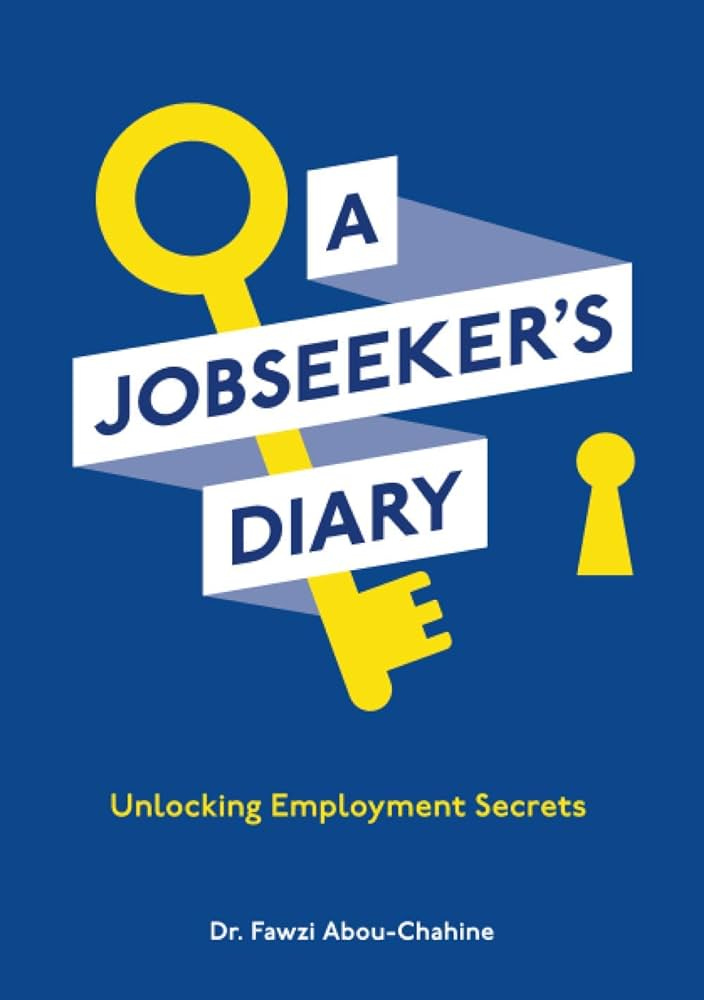
The fact that Fawzi left academe in 2015 shows how quickly PhDs can climb from entry-level roles to the executive suite. After serving as Technical Sales Lead with a London-based company, then Proposal Manager with the National Physical Laboratory, Fawzi founded Chahine Consulting, which led to his current position. His professional journey also shows how fluid the boundaries between industry and entrepreneurship can be. Sometimes hanging out your own shingle can attract a recruiter’s eye.
We talk a lot about identity today – how all of us are more than our current roles. It’s a good reminder, not only for negotiating the boundaries between work and private life, but also for putting our foibles into perspective. If we are more than our jobs, then we are infinitely more than our most recent mistakes.
***
Joshua Doležal: Fawzi, maybe we'll start with what we have in common – we were once both academics and if I'm not mistaken, you left academe before you got on a tenure track or entered a really serious faculty position. You were still a PhD researcher?
Fawzi Abou-Chahine: Mostly. So I did do a postdoctoral research position. It was a fellowship for a applied technology university in Finland. And I guess it works slightly differently than, say, North America. If you have worked in North America, then there's just a higher number of fantastic universities, so you can tend to stay in the same country, even though you probably may move cities, so logistical, legal, financial challenges are slightly different, but yes, I did, for the most part, move away from academia after a one-year position in Finland.
Joshua Doležal: That's a distinction that I haven't really considered much, that Europeans are forced to move internationally for jobs in academe. But I am struck by how almost identical the systemic problems are. I grew up idealizing the European university system, thinking that it was better funded, that the life of the mind was somehow privileged more in the cradle of Western civilization. You and several other LinkedIn contacts that come from a European background, Matteo Tardelli –
Fawzi Abou-Chahine: Yes, I know, Matteo.
Joshua Doležal: Luna Clara Muñoz and others, have experienced almost exactly the kind of alienation that American academics have. And it comes from a corporatized university, it seems. And so that's happening in Europe, just the same as in the U. S. Was it the family responsibilities? Was it a cultural community that you wanted to stay connected to? What made you unwilling to uproot yourself?
Fawzi Abou-Chahine: Yeah, they both have their separate challenges. I think it's much more of an industry in North America. It's a much higher volume of PhDs. It's more clear-cut what the roles are. And , even though there's lots of different funding bodies, there's also just one ultimate parent funder. Which is that, for example, in America would be the U. S. Government, whereas in in Europe, certainly from my experiences, numerous sources of funding. This is a generalization, but they come with their own stipulations timeline funding amount. Flexibility to move. Just on the subject of challenges of when you do have to move around. I think that can particularly impact some communities more than others. People who may be lower socioeconomic conditions, the less wealthy, people who try to raise a family or have caring responsibilities, visa restrictions and that can hinder the kind of equality we're trying to achieve, which is another disappointment for the academic journey.
I think that's just one of many reasons why lots of people leave and why I in particular left.
Joshua Doležal: One thing that I've talked with so many other academics about, and I call myself with not really that much sense of irony, a recovering academic, is this real identity shift that you have to make. You have these ideals in academe that you, thought the life of the mind or the pursuit of knowledge, something that was more pure in certain ways, was your goal, your purpose. And when business in the U. S. began to encroach on that, that's where a lot of us felt like we couldn't live in academia any longer.
But then when we try to transition into business, how do you reconcile who you are? How do you fit yourself into this new paradigm? And it seems like a paradox a lot of times. So how have you solved that paradox?
Fawzi Abou-Chahine: Absolutely. I think no one talks about those specific challenges. They certainly didn't when I left 11 years ago. I think they're beginning to have that conversation now. For me the challenge was not only finding work, but also valuing the skills that I had, and I'm actually writing an article for Nature Careers at the moment about this, which is…there is this idea that if you're a chemist, you are just a chemist, or social historian, and that's all you do.
But the reality is, those skills in identifying information, finding it, comprehending it, then explaining it to someone else or managing multiple projects at the same time – those are very transferable skills. You can apply them anywhere, provided you appreciate that value. And that was the hurdle I had to overcome mentally. And I found that not many people were doing that. Not many people were talking about that realization. So that's why I do what I do. Talk at universities, write articles, promote my book, to talk about the firsthand experience of that transition. I think there's also a sort of emotional barrier, perhaps reluctance to admit that you're not finding it an enjoyable experience to pursue a career in academia.
So no one wants to admit those difficulties, certainly they don't want to admit the mental challenges of finding employment, which is difficult enough, not least in an economic downturn that we may be going through. And certainly, if you are a carer or someone trying to raise a family, those come with their own unique challenges of finding work. It's very hard to find work if you're employed, for example, if you've got a lab project – and so, no one has those conversations and no one wants to admit that they're going through those difficulties. And that's really what I want to do: to just make it clear that these are normal things.
I think the last point I'll make about the academic, challenges as well is actually academia is a business, and the sooner people realize that, the easier it'll become to find work. Obviously it's not a business in the traditional sense, but they do have a profit and loss. They do monitor how much money they're bringing in through various revenue and how much they're spending. Their funding mechanism is different. They have large pots of funding. But the idea that there is human resource staff, PhDs that they need to pay, and they also need to hire and acquire and grow. So when it comes to applying for your PhD, you've probably applied a very academic and technical focused application, but subsequently when you're looking at fellowships or postdoctoral positions, even a professorship, you also need to make it clear the value you bring from a sort of pseudo-commercial element.
You need to recognize your skills that are relevant. Also the skills that are not relevant. And I think that approach, that mindset to applying for jobs, can be very helpful. You are in the job market. You are competing with others. And that is, I think, what people don't highlight.
Joshua Doležal: Even so, there is a learning curve in translating skills for a more industry-based audience. This seems to be the Slough of Despond that academics find themselves in for a period, dealing with the identity shift, but also just the mechanics, the logistics of making that case to a different audience.
And so you made several mistakes, it sounds like, in that that transition. So what were some of those hard lessons that you learned?
Fawzi Abou-Chahine: No one really wants to admit this, but hopefully by talking about this, you can dispel the idea that admitting to a mistake or somehow being wrong is a bad thing. I think especially in academia, you have this mindset: you must never admit that you're wrong, or that if you are wrong, then somehow you are stupid. Maybe that is a particular neurotic facet of some academics, but certainly I think it is quite common because you're surrounded by such smart people. I think there's a difference between being intelligent and being ignorant, and generally people are ignorant about something they've never experienced, such as looking for work, so some of the mistakes, for example, include not recognizing the importance of network, of approaching people that I'm interested in working with either through a connection or sometimes coldly can be a bit of a challenge. Using the right language in applications of talking about how it's a commercial process to apply for work, focusing too much on the wonderful work of my research, for example, rather than the amazing skills I developed doing the research.
That is the subtle difference that I think I've learned among the many things.
Joshua Doležal: I've heard others say that what you need to do is think about problems that others have and then how you can solve them, present yourself as the solution to those problems. And for job seekers, one piece of advice often is to create a brief collection of portfolio artifacts that offer proof of that. Here is me identifying a problem and solving it using a tool that could be Articulate Storyline for people going into instructional design, or it could be Tableau for someone working with data.
So I know this is an enormous question and perhaps hard to kind of corral, but in your line of work, what are some business problems that you have to deal with on a regular basis? And if someone were trying to get into your field, you're involved with fundraising, but also with…I don't know if finance is accurate?
Fawzi Abou-Chahine: Yes. So what I do is I write funding proposals for large and small companies to secure funding that helps their business grow. I need to be able to articulate the work they do, the justification for funding and how it will deliver impact. So that requires a series of skills that my PhD helped develop, specifically understanding lots of information that I'm not familiar with, being able to concisely communicate that clearly, and analyze lots of information.
And usually I'm doing multiple proposals at the same time, so multiple research projects, for example, gives you that project management. Recognizing that I can apply that to a different field beyond the immediate research application was a game changer for me, and I think that's something that people need to recognize.
So that is what I do on a day to day basis, and certainly a PhD would be able to do that. I want to go back to one of the things that you said about phrasing your application as solving someone's problem. Absolutely, that's a good approach, and actually that is a commercial approach. The way I fund my funding proposals, for example, is: the funder has a problem they're trying to solve, the company can solve it through their innovation, for example.
In an obvious academic setting, the problem that the university hiring someone is looking to solve is we need to produce more high-quality papers, this researcher can do that. But beyond that obvious problem, there could be a say, a more commercial problem, such as, if you're applying for, for an editorial position, the problem might be, we need to write high-quality, compelling articles. I can do that because I've got the experience writing to tight deadlines, would be the solution, and that's how I would phrase it.
Joshua Doležal: I'm reminded of a technique that I would often advise to students in research writing, but also in creative writing, which is problem posing. Good research is driven by a burning question that you really have to answer. You have to pose a problem that has high stakes that someone would care about and position yourself, as the researcher, as the solution to that problem.
So that's kind of how we get research published is convincing a peer reviewer that you are in fact resolving something that needs to be resolved, right? And so it seems like one of the secrets is just learning how to see those problems, locate them, identify them, and then position your skills as the answer to them.
One of my friends wrote a great essay about a graduate seminar in creative nonfiction that he took. He was a fiction writer, and you would think it would be a natural transition to writing memoir. But in fiction, he could look at the world around him and locate stories – here's a plot, here's a character that I could develop in this way. But he was not accustomed to looking at his own life in that way. So the title of his essay was “Learning to See,” and it was all about locating those potential narrative arcs within his own life in places that it just seemed episodic or there was no point to it or why would anyone care?
He was able to frame it in a way that did have stakes, that did make someone care. So I wonder in business if it's the same way as an academic, you sort of understand how to apply for academic jobs, what those problems are, how you offer a solution. If someone's coming into finance or into fundraising, how would they be able to identify…here is the thing that needs to be solved?
Fawzi Abou-Chahine: I really like the idea that you have to be able to see. Researchers are really good at understanding the question in order to solve it. There's a quote often attributed to Einstein that he'll spend 90 percent of his time understanding the question before answering.
I was actually talking to my wife earlier today about measuring something and the importance of measuring, and that's what a researcher will do, understand what it is we're trying to measure or solve or question. Researchers definitely do that bit really well. Applying it to business is really important.
In the rest of our conversation, Fawzi explains why he titled his book a “diary” and outlines the 3 strategies he would recommend for job seekers trying to avoid the frustration and wasted time from his own transition.




